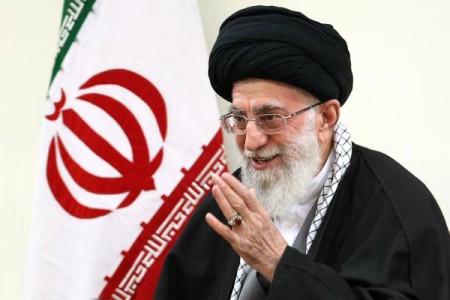LATEST
The Supreme Leader has used last week’s open letter from 47 Republican Senators to renew his warning, amid critical nuclear negotiations, of a US of “deception, trickery, and backstabbing”.
The Senators warned the Iranian regime that any nuclear deal agreed with the Obama Administration is not binding, unless it receives Congressional approval.
Addressing members of the Assembly of Experts on Thursday, Ayatollah Khamenei returned the attempt at a political and legal lesson:
In the letter, they said they want to teach their rules to Iran… We do not need to learn from them.
All countries in the world — in accordance with generally accepted international relations — remain committed to its obligations [even] after changing administrations.
The response was the path to a wider and more important intervention in the US-Iran nuclear talks, which resume on Sunday and are joined by European Foreign Ministers on Monday in Switzerland.
While backing Iran’s negotiators — and thus the Rouhani Government — as “good, reliable, and sympathetic individuals”, the Supreme Leader called for caution in any advance towards a comprehensive settlement by March 31, the unofficial US deadline for a resolution:
America always adopts a harsher and more aggressive tone whenever the deadline for reaching a comprehensive deal approaches….
I am concerned because the other side is into deception, trickery and backstabbing.
Khamenei backed up the concern with the example of the letter, “Is this not the ultimate collapse of political ethics and the internal disintegration of America’s system?”
Top Rouhani Advisor Points — Unwittingly — To $60 Billion Fall in Iranian Revenues
President Rouhani’s senior economic advisor Mohammad Baqer Nobakht has pointed — unwittingly — to the Government’s serious problem over revenues.
Complaining that Iran has not received almost $8 billion from its oil sales, Nobakht said revenues in the past 12 months had totaled $52.8 billion at the official rate of the US dollar.
The figure is a drop of almost 50% from Iran’s income of $100 billion in 2012. The fall is even more serious if the current market exchange rate for the US dollar is used, with the past year’s income falling to about $40 billion.
The Government’s budget for 2015/2016, presented to Parliament earlier this year, tries to cover the $60 billion hole with references to increased tax revenues and income from non-oil exports.
Nobakht’s statement on Thursday indicated that the problem is compounded by sanctions hindering international bank transfers of oil income to Tehran, despite an interim agreement since January 2014 providing a payment mechanism for exports of up to 1.1 million barrels of oil per day.
Iran’s sales have topped that figures in the past year, reaching about 1.4 million bpd.
State outlet Press TV tries to maintain optimism, citing Nobakht’s figure of 2.5% growth in 2015 and asserting, “Many experts say the idea that the economy could ever run out of steam under intensive penalties is absolutely misplaced.”

